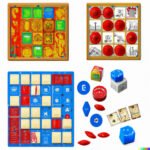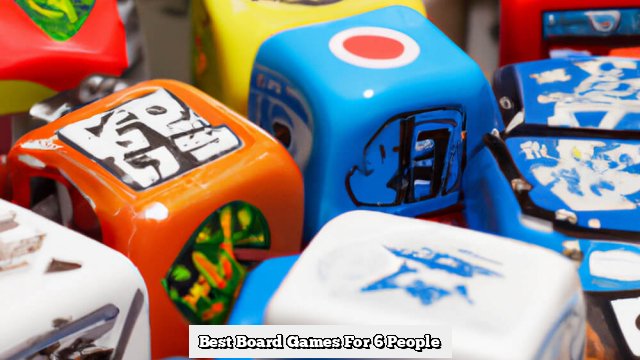What classic board game do people enjoy most? From the thrill of rolling the dice to the satisfaction of outsmarting your opponent, classic board games have been entertaining individuals and families for generations. In this article, we will delve into the timeless appeal of these beloved games, exploring their history, psychology, and social impact. Join us as we uncover why classic board games continue to hold a special place in our hearts and homes.
Board games have a rich history that dates back thousands of years, with origins rooted in different cultures and civilizations. Throughout time, these games have evolved alongside human society, adapting to new technologies and cultural changes. Understanding the history of classic board games can provide valuable insight into their enduring popularity and widespread appeal.
The psychology behind why people are drawn to classic board games is also a fascinating topic to explore. What is it about these games that captivate our attention and keep us coming back for more? From the sense of competition to the social interaction they promote, there are various factors that contribute to the enduring enjoyment of classic board games. Let’s take a closer look at what makes them so irresistible to players of all ages.
The History of Classic Board Games
One of the earliest known board games is Senet, which originated in ancient Egypt around 3100 BC. This game involved a grid of 30 squares and players had to move their pieces based on the roll of dice. Another classic game, Mancala, traces its origins back to ancient Africa and remains popular in many parts of the world today. The game involves capturing opponents’ pieces by strategically sowing and reaping beans or seeds.
As time went on, board games evolved to reflect changes in society and culture. In the 19th and 20th centuries, classic board games such as Monopoly, Scrabble, Chess, and Checkers gained immense popularity and became household names. These games incorporated elements of strategy, chance, and skill that appealed to people of all ages.
Today, the influence of classic board games can be seen in modern tabletop gaming culture, where a resurgence of interest has led to new variations and reimaginings of old classics. From traditional family game nights to international chess tournaments, classic board games continue to captivate players around the world with their rich histories and enduring appeal.
The Psychology of Classic Board Games
Classic board games have stood the test of time, captivating people of all ages for generations. But what is it about these timeless games that continue to captivate and engage players? The psychology behind the appeal of classic board games sheds light on why people continue to enjoy them.
One reason for the enduring popularity of classic board games is that they provide a sense of familiarity and nostalgia. Many people have fond memories of playing these games with family and friends, creating a strong emotional connection to them. Additionally, classic board games offer a break from technology and screens, allowing players to engage in face-to-face interaction and meaningful social connections.
Another psychological factor that contributes to the enjoyment of classic board games is the element of competition and strategy. Players are challenged to think critically, make strategic decisions, and anticipate their opponents’ moves. This aspect can be mentally stimulating and rewarding, as it provides a sense of accomplishment when players successfully outmaneuver their opponents.
Moreover, classic board games offer a sense of escapism and entertainment. Whether it’s navigating through a fictional world, solving puzzles, or engaging in lighthearted competition, these games provide an opportunity for players to immerse themselves in an enjoyable activity that allows them to momentarily leave behind the stresses of daily life.
- Classic board games provide familiarity and nostalgia
- They offer a break from technology and promote face-to-face interaction
- The competition and strategy elements are mentally stimulating
The Top 5 Most Popular Classic Board Games of All Time
When it comes to classic board games, there are a few that have truly stood the test of time and continue to be enjoyed by people of all ages. These timeless games have captured the hearts of generations and remain popular even in the digital age. Let’s take a closer look at the top 5 most popular classic board games of all time.
Chess
Arguably one of the oldest and most strategic board games in history, chess has been played for centuries across different cultures. With its intricate rules and endless possibilities, chess continues to challenge and captivate players around the world.
Monopoly
Since its creation in 1935, Monopoly has become a staple in many households. The game revolves around buying, selling and trading properties, making it both entertaining and educational. With various editions and themed versions available, Monopoly remains a favorite among families and friends.
Scrabble
For lovers of words and language, Scrabble offers an engaging way to showcase vocabulary and strategic skills. This classic game has maintained its popularity for decades, with tournaments held globally and online versions keeping up with the digital age.
Clue
Originally known as Cluedo in the UK, this murder mystery game challenges players to solve a crime by deducing clues and identifying the culprit. The element of mystery and strategy has made Clue a beloved classic for those who enjoy a good whodunit.
Risk
For fans of global strategy and conquest, Risk offers an immersive experience of world domination through careful planning and calculated risk-taking. With its blend of luck and skill, Risk continues to be a favorite among strategy enthusiasts.
These top 5 classic board games have retained their popularity over the years due to their enduring appeal, offering entertainment, intellectual stimulation, social interaction, and strategic challenges that keep players coming back for more.
The Social Aspect of Classic Board Games
One of the key elements that make classic board games so socially appealing is their ability to encourage face-to-face interaction. In today’s digital age, where much of our communication happens through screens, board games provide an opportunity for genuine human connection. Players are able to engage in conversation, share laughter, and enjoy each other’s company in a way that is often lacking in our increasingly virtual world.
Additionally, classic board games have the ability to bring people from different generations together. Grandparents can pass down their favorite games to their grandchildren, creating a multi-generational tradition that fosters family unity. The simple pleasure of sitting down at a table with loved ones and engaging in some friendly competition is timeless and has an enduring appeal that transcends age, making classic board games a beloved pastime for people of all ages.
| Social Aspect | Description |
|---|---|
| Face-to-face interaction | Classic board games encourage genuine human connection through conversation and laughter. |
| Multi-generational appeal | Board games bring people from different generations together, fostering family unity. |
The Timeless Appeal of Strategy in Classic Board Games
Classic board games have stood the test of time, captivating people of all ages with their timeless appeal. One of the key factors that contribute to their enduring popularity is the strategic element they offer.
Whether it’s plotting your next move in a game of Chess or carefully managing your resources in a session of Settlers of Catan, classic board games provide players with the opportunity to exercise their strategic thinking skills in a way that is both challenging and enjoyable.
The appeal of strategy in classic board games lies in the mental stimulation they offer. Players are required to think several moves ahead, anticipate their opponent’s actions, and make tactical decisions that will ultimately determine the outcome of the game. This level of engagement not only keeps players mentally sharp, but also provides a sense of satisfaction when a well-devised strategy pays off.
The strategic aspect of classic board games also adds an element of replay value. Since the outcome of each game can vary based on the strategies employed by the players, there is always room for experimentation and improvement. This encourages repeated plays, as individuals seek to refine their strategies and outwit their opponents. Ultimately, it is this timeless appeal of strategy that continues to draw people to classic board games year after year.
- The mental stimulation offered by classic board games
- The satisfaction derived from successful strategic planning
- The replay value created by varied gameplay based on different strategies
The Resurgence of Classic Board Games in the Digital Age
In the digital age, classic board games have experienced a resurgence in popularity. While video games and mobile apps have become increasingly dominant forms of entertainment, classic board games have managed to find a new audience among both young and old. This revival can be attributed to the growing trend of nostalgia, as people seek out familiar and comforting experiences from their past.
One of the main reasons for the resurgence of classic board games is the rise of online platforms and digital adaptations. Websites and mobile apps now allow players to enjoy these timeless games with friends and family members who may be located across the world. This has made it easier than ever for people to connect and play together, regardless of distance or time constraints.
Additionally, many individuals have expressed a desire to step away from screens and engage in more offline activities. Classic board games provide an opportunity for social interaction, face-to-face communication, and shared experiences that cannot be replicated by virtual environments. As a result, these traditional games have become a popular choice for gatherings, parties, and casual get-togethers among various age groups.
| Reasons for Resurgence | Impact |
|---|---|
| Rise of online platforms and digital adaptations | Easier connection with distant friends and family members |
| Increase in desire for offline activities | Opportunity for social interaction and shared experiences |
The Future of Classic Board Games
Classic board games have stood the test of time, enduring for generations and remaining popular among people of all ages. As we look to the future, it is clear that classic board games will continue to adapt and thrive in modern times. With the rise of digital technology, classic board games have found new life in the digital age, reaching a wider audience and evolving to meet the demands of a changing world.
One of the key factors in the future success of classic board games is their ability to bring people together. In an increasingly digital world, there is a growing desire for face-to-face interaction, and classic board games provide the perfect opportunity for social connection. Whether it’s with family or friends, these games create memorable experiences and foster meaningful relationships.
Furthermore, classic board games offer a timeless appeal that transcends technological advancements. The strategic thinking, problem-solving skills, and competitiveness that they entail will always be relevant, making them a valuable form of entertainment and mental stimulation. As such, it is safe to say that classic board games will not only survive but continue to flourish in modern times.
Frequently Asked Questions
What Is the Most Popular Traditional Board Game?
The most popular traditional board game is likely to be chess. With its rich history and widespread popularity, chess has been enjoyed by people from all walks of life for centuries. Its appeal lies in its strategic depth, intellectual challenge, and the ability to improve cognitive skills.
What Board Games Do Old People Like to Play?
Old people often enjoy playing classic board games such as Scrabble, Mahjong, Bridge, and Backgammon. These games provide social interaction, mental stimulation, and an opportunity to reminisce about the past. These timeless favorites have stood the test of time and continue to be beloved by older generations.
What Board Game Is the Most Popular?
The most popular board game is subjective and can vary depending on factors such as region, age group, and personal preferences. However, some of the most widely recognized and played board games worldwide include classics like Monopoly, Catan (formerly known as The Settlers of Catan), Risk, Ticket to Ride, and many more.
These games have amassed a large following due to their replay value, entertainment factor, and potential for creating lasting memories with friends and family.

I love playing all kinds of games – from classics like Monopoly to modern favourites like Ticket to Ride.
I created this blog as a way to share my love of board games with others, and provide information on the latest releases and news in the industry.





